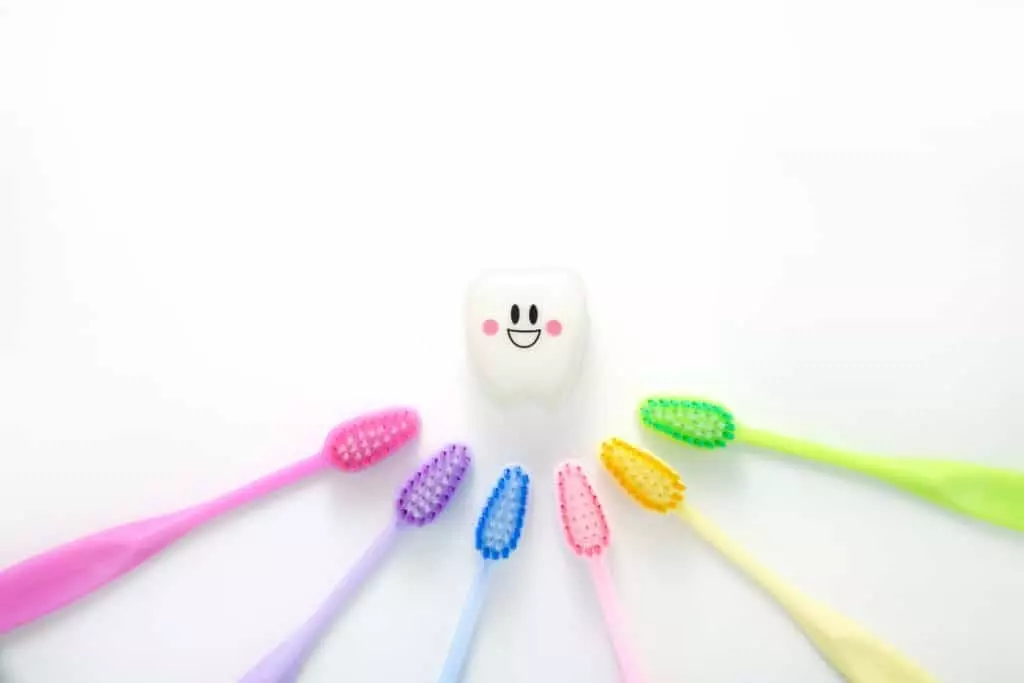
February is National Children’s Dental Health Month. Whether your little one has yet to develop his or her first tooth or they’re currently making a fortune off of the tooth fairy, taking care of their teeth from day one is important.
The American Dental Association (ADA) created National Children’s Dental Health Month (NCDHM) on February 8, 1949, in an attempt to improve America’s pediatric oral health. At the time, dentistry wasn’t nearly as advanced; in fact, many children lost teeth early in life to advanced decay and caries.
Pediatric dentistry and oral health has come a long way since 1949, but fostering a healthy smile still comes down to the same simple concept: developing healthy habits from day one.
As a parent, you play an intimate role in teaching your child healthy oral health care habits. That’s what we want to talk to you about this month during National Children’s Dental Health Month. From simple pediatric dental care facts to advanced strategies for handling dental issues, this short primer contains a wealth of information for parents.
Happy Children’s Dental Health Month!
Children’s Dental Health Facts
As a parent, you want to do everything you can to encourage better oral health in your child. Despite advances in pediatric oral health, nearly 50 percent of children will still experience tooth decay before they reach adulthood. Your level of literacy on the topic can significantly reduce those rates.
This Children’s Dental Health Month, let’s take a look at the most important key facts:
- By around six months of age, most children have at least one tooth. The American Academy of Pediatric Dentistry (AAPD) recommends that parents and kids visit the dentist for the first time around the same time. By the age of one, children should have had at least one visit with the dentist.
- Children should see the dentist at least once every six months. If the dentist identifies any issues at your initial appointment, he or she may recommend seeing returning more often.
- Tooth decay is, in fact, classified as a disease – a very common disease. The AAPD estimates that children experience tooth decay 20 times the rate of other childhood diseases, including Juvenile Diabetes and Asthma.
- The Centers for Disease Control and Prevention (CDC) estimates that nearly 20 percent of all American children have untreated cavities, with 42 percent of those children experiencing cavities in primary teeth.
- Most experts agree that simply brushing with fluoride toothpaste two to three times per day is the best way to prevent dental issues, regardless of age.
- Fluoridated tap water plays an important role in keeping your child’s mouth healthy. Fluoride protects enamel from breaking down, a key preventable process in the development of dental caries.
- Some dentists are now using fluoride shellacs that are painted onto the teeth to protect enamel. Fluoride drops and supplements placed in milk may also help to protect teeth, especially in areas without fluoridated water.
- Dentists also warn that diet and feeding habits can significantly impact dental health early in life. Nursing to sleep, taking a bottle before bed, and eating too many sugary foods (including soda or juice) can all increase your child’s risk for tooth decay.
The Goal of Children’s Dental Health Month: Developing Healthy Habits
The main goal of Children’s Dental Health month is developing good dental health care habits. This starts in infancy; from there, parents can solidify good habits for life simply by being consistent. This includes demonstrating good oral health care habits yourself through ensuring that children brush, floss, and take care of their teeth every single day.
Next, we’ll take a look at the best ways to encourage better oral health throughout every childhood life stage.
Infancy
There’s nothing quite like looking down at the gummy smile of a brand-new little one to make you smile, too. This is the perfect time to start focusing on dental care, even if your little bundle of joy won’t necessarily understand the intention just yet.
Although some parents believe that good dental health begins only when children finally develop teeth, dentists disagree. Most pediatric oral health professionals recommend starting oral health care efforts in infancy. You can do this by gently massaging the gums with a soft baby toothbrush or even a moist washcloth.
Be mindful that your little one’s gums may be sensitive as they begin teething. Compounded numbing topicals designed specifically for babies may help to reduce this pain. Chewing on cold teethers and other baby teething products can also reduce pain.
Teething can occasionally cause issues for little ones. While some redness and/or swelling is normal, any serious swelling, bad odors, or bleeding may be a sign of infection. Additionally, although it is exceptionally rare, some infants do experience cavities shortly after eruption. Your doctor and/or dentist can help you address these issues if you’re concerned.
As children age and develop their first teeth, continue your daily brushing regimen. Dentists recommend using water only until around the age of three, when little ones are less likely to swallow toothpastes.
Toddlerhood
Once children reach the age of three, they can officially begin brushing with fluoridated toothpastes. As a parent, you should supervise their use, ensuring they use only a pea-sized amount. By about three or four, you can begin to introduce flossing, too. Just be aware that you may have to do the majority of the work, at least for now.
Continue your daily brushing habits, using fun toothbrushes, singing, and tooth care games to make the experience positive for your child. Playing a three-minute-long song as you brush is a great way to ensure kids brush long enough at each session.
Be mindful of the influence of diet on toddler oral health. At this life stage, parents often begin allowing more sugar into the diet. Whether that sugar comes from fruits and vegetable or starchy foods and sodas, it’s still a risk to your little one’s teeth. Limit these foods and stick with natural fruits and vegetables over processed junk whenever possible.
Childhood
By around five or six years of age, children begin to develop more autonomy and independence. Unfortunately, that also means it’s prime time for them to begin refusing to brush or floss. Stick to your guns, even if it means struggling for a few nights; good habits require repetition, and your child will thank you later on down the road.
If children are particularly resistant toward brushing and/or flossing, it may be a sign of decay or oral pain. Have your little one in to the dentist for a checkup if you suspect a problem.
Around 50 percent of all children will experience a dental injury at this life stage, including injuries to the mouth, lost teeth, broken teeth, and chipped teeth. These injuries should always be addressed by a dentist because they can impact how the adult teeth grow in.
Most childhood tooth injuries are preventable. Teach little ones to play safe, and use mouth guards or helmets when playing sports, riding a bicycle, or engaging in risky fun or games.
If your child does experience a broken or lost tooth, your dentist may be able to repair it. Put the broken portion of the tooth into a jar of milk and seal it up. See your dentist within 12 to 14 hours for the best chance of a repair.
Dentists may also recommend dental sealants to protect enamel during childhood. This is especially true if your little one already has a history of caries. These sealants are painted onto the teeth in the office and last for several months or years. They effectively seal enamel in, preventing wear.
Pre-Teen Years
By the pre-teen years, most little ones understand oral health care basics enough to be somewhat autonomous with care. Parents should continue to provide guidance and monitor for issues along the way.
Pre-teens often overlook brushing and flossing simply because they are too busy being excited, joyful children! At this age, children are old enough to begin understanding the consequences of failing to attend to their oral health care needs. Sit down with your little one and use diagrams and/or teaching materials to express why it’s so important. Answer their questions truthfully with age-appropriate scientific facts.
If the teeth are overcrowded, growing in crooked, or failing to grow in straight within the mouth, your dentist may refer you an orthodontist. Some little ones do fine with just a nighttime retainer, while others may require braces for several years to correct serious alignment issues with the teeth.
If children do need cavities filled and/or teeth removed, you can make the process less stressful in a few specific ways. Firstly, speak to your local compounding pharmacy – they can provide a compounded topical anaesthetic to numb the mouth prior to your child’s appointment. This can make injections easier to handle.
Secondly, visit a dentist who specifically works with children. Pediatric dental offices are often set up in a way that’s much friendlier and less stressful, ensuring that children don’t develop serious dental fears that prevent dental care access later in life.
Teenagerhood
As children become teenagers, they often become more autonomous about brushing their teeth, requiring little to no prompting from mom or dad. You should still provide occasional monitoring and reminders to ensure that brushing and flossing is happening at a minimum of twice per day.
Teenagers, unlike children, toddlers, or infants, are often exposed to unique dental health concerns. This includes the pressure to smoke or use tobacco, the desire for oral piercings, and eating too much sugary or processed food. Unfortunately, this also means that they are much more likely to experience decay at this life stage.
Encourage kids to make good decisions about their oral health, including empowering them to say no to smoking and waiting until later in life for piercings. If you do decide to allow your child to get an oral piercing, visit your dentist first for guidance on how to do it safely. Make wearing mouthguards and protective gear mandatory for kids participating in sports.
Lastly, the older your child is, the more likely concerns about appearance are to cause them to desire whitening and other cosmetic procedures. Encourage your kids to come to you with these concerns, rather than simply purchasing products off the shelves. Many of these products can cause significant side effects or even erosion of enamel if used incorrectly or too often. Worse yet, they may cause sensitivity and/or pain. Your pharmacy and/or dentist can provide more teen-appropriate solutions that achieve the same goals with far less risk.
This Children’s Dental Health Month, learn how to promote healthy habits in your children. By creating a healthy dental care routine, your children will grow up with strong healthy teeth. Speak to your pharmacist or dentist if you have further questions regarding Children’s Dental Health Month and healthy dental care.

 info@burtsrx.com
info@burtsrx.com


